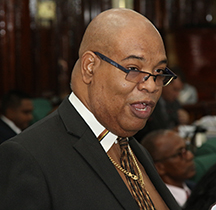Huge increases with immediate effect were unveiled on Monday by the government in thresholds for the restricted tendering of contracts for goods and services and construction, raising eyebrows and the ire of the opposition.
Shadow minister of finance, PPP/C MP Juan Edghill yesterday released a copy of the circular signed by Mark Bender, Deputy Chairman of the National Procurement and Tender Administration Board (NPTAB).
In the circular, Bender advises permanent secretaries, agency and corporation heads and regional administrations that the threshold for restricted tendering in the case of contracts for goods and services has leapt from $3m to $10m – 233% – while the threshold for contracts for construction has zoomed from $10m to $20m.

The request for quotation method also sees a doubling in its threshold from $1.5m to $3m.
While these methods of tendering still must adhere to the Public Procurement Act rules, critics have previously argued that it is easier to channel such contracts to a select group of persons as distinct from open tendering where there is public advertisement. The higher thresholds would mean that a significant number of contracts would no longer be available to open tendering and the procuring entities would have a major say in who would be invited to tender. The huge change in the thresholds in the aftermath of the December 21, 2018 no-confidence vote and the likelihood of early general elections will also likely raise concerns.
Yesterday, Edghill warned that heads of agencies should ignore the increases as he said they are illegal in the aftermath of the passage of the motion of no confidence which considers that Cabinet is no longer functioning and a caretaker government is in place.
However, the NPTAB sees no illegality in the move with Bender yesterday stressing that Minister of Finance, Winston Jordan acted in accordance with the law and has not changed thresholds for ministerial or regional agencies but for two methods of procurement at the national level.
“All of this was made by Order dated 23rd Day of January 2019 more than one month after this APNU+AFC government was defeated by way of successful no confidence vote on December 21, 2018. Article 106(6) of our constitution states that on passage of a no confidence motion by the majority of all elected members of the National Assembly, the President and his Cabinet shall resign, coupled with the CJ’s ruling of January 31, 2019 that following the passage of the motion, the President and Cabinet stand resigned. Therefore, they are merely in office in a caretaker capacity and as such, these actions are unconstitutional,” Edghill said in a statement yesterday.
“It is therefore logical that the letter dated 4 February 2019 by Mr. Mark Bender, Deputy Chairman of the NPTAB authorizing Permanent Secretaries, Heads of agencies and Corporations and regional Administrations, with immediate effect to implement these new thresholds are illegal and will lead to criminal proceedings being instituted against Public officials who may be tempted to act on such a directive which is illegal,” the shadow finance minister charged.
Bantering
Bender told Stabroek News that he will not deal with Edghill’s letter and the allegations therein as he does not want to be caught up in politics and political bantering.
Bender said that while Edghill has questioned the legitimacy of the document he is following orders in accordance with the Procurement Act and that there is nothing sinister in the amendments.
“What we have amended is the thresholds for two methods of procurement: restricted tendering and request for quotations,” he said.
“The thresholds with regards to the ministerial and the agencies and regional tender boards have not been changed,” he added.
He explained that changes were made to the thresholds in 2016 and are annually revised to cater for market changes and other factors. Bender said after analysis over the two-year period, it was recommended by procuring agencies and from analysis of the NPTAB that the threshold for methods be revised again.
“We are constantly analyzing these things. We have discussions with procuring entities and you know analysis of the general market conditions, types of procurements and from the numbers of analyses resulted in these changed thresholds,” he said.
The APNU+AFC government has been flayed for severe breaches of the national procurement system, particularly in the health sector.
Edghill questioned the timing of the Minister of Finance’s actions saying that his action “enables award of contract without Public Advertisement, by way of Restricted Tendering and subverts the use of qualifications for this procurement process to be confined to specialized services or procurement of highly-complex items as stated in 26 (1) (a) of the Procurement Act of 2003. The minister has increased the threshold catered for in 26(1) (b) of the Procurement Act.”
“In layman’s terms, the Minister has made it possible to give contracts to unqualified persons and companies for the procurement of Goods and Services from $3M to $10M (233%) which was already increased when this APNU+AFC came into office and for construction from $10M to $20M (100%) and the three quotation system from $1.5M to $3M (100%),” Edghill posits.
With elections imminent, Edghill is of the opinion that the decision was a political one aimed to win voters. “This is a blatant political scheme to buy votes… “ he charged.
It is to this end that he signaled a warning to public officials that if they follow through with the directive of the Ministry of Finance and NPTAB, they risk court action should the government change after the elections. “Public Officers and Heads of Budget Agencies are forewarned as stated by the Leader of the Parliamentary Opposition to keep notes, log all correspondences given and be reminded that as accounting officers, they will be held responsible for any unapproved spending of the public’s money. Beware for whom the bell tolls, for it tolls for thee,” Edghill said.
Bender said that using the methods are in no way subverting the procurement processes or laws as although there is restricted tendering, that method has to adhere to the NPTAB and lawful rules. “Restricted tendering is not you going and hand select anyone as anyone want you to believe. I don’t know what Mr. Edghill would have explained but I am telling you and anyone this, the Procurement Laws are online. It is there for everyone to read, just see what it says about the methods. You still have to invite all the bidders who were say, prequalified to a tendering process which is then evaluated and so on. You go through all the processes- you invite bidders, you open bid, they have to get compliance…. you evaluate…the only thing you don’t do is advertise. You do everything else as open tendering and it is a matter of practicality,” he said.
“I cannot over emphasize enough that the threshold for ministerial, departmental agencies and regional agencies have not increased. What has increased are the methods for procurement,” he added.





